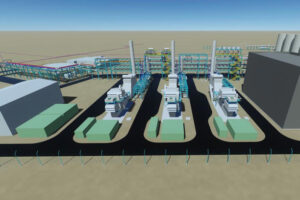New plans unveiled for ‘UK’s first’ net-zero neighbourhood
Sero Homes has released new CGI images from Parc Hadau in Wales, which is set to be the UK’s first net-zero neighbourhood.
The £8m development will use very low energy building design to reduce the energy demands of the homes and their residents. This will be combined with a mix of renewable energy technologies, including thermal and electrical storage, on-site solar panels and ground source heat pumps, electric vehicle (EV) rapid charging points, together with ventilation systems and smart energy management systems.
It will also be the first scheme in the country to meet the UK Green Building Council’s definition of net-zero carbon, by tracking real-time ‘in-use’ carbon emissions when the homes are running.
The site has been designed by Welsh architects Loyn + Co and landscape architects Farrer Huxley who wanted to incorporate both wetland and meadow whilst including a large central communal garden, with the aim of creating a seamless integration between people, nature and wildlife.
Preparation works for the 35 new homes began on site in March this year, with construction expected to start in the summer (subject to COVID-19 safety requirements).
Sero’s managing director, James Williams, said: ‘These new images really bring to life how landscaping at Parc Hadau is central to the overall design of the scheme, helping create a unique sense of place that is focused around nature and community.
‘We want to create new homes that are better for the environment and better for people, and part of this is by helping adjust the way we live day-to-day and use energy.
‘The COVID-19 crisis has demonstrated how a change to our everyday lifestyles can have a huge impact on the environment, and in a similar way, Parc Hadau shows the positive design impact that a change in priority or lifestyle can have. For example, the scheme is designed around active travel, prioritising pedestrians rather than cars.
‘It means Parc Hadau has a permeable one-way driveway at the perimeter of the site instead of a central tarmac road, that allows a communal garden to form the heart of the site – hugely altering the overall look and feel of the scheme.’
In February, Environment Journal spoke to Sero’s co-founder, Andy Sutton, to learn more about the project.















